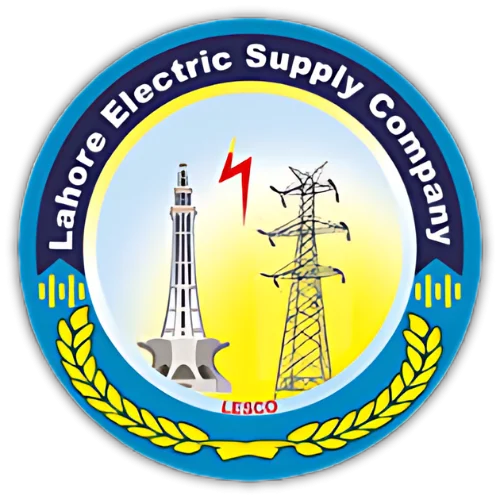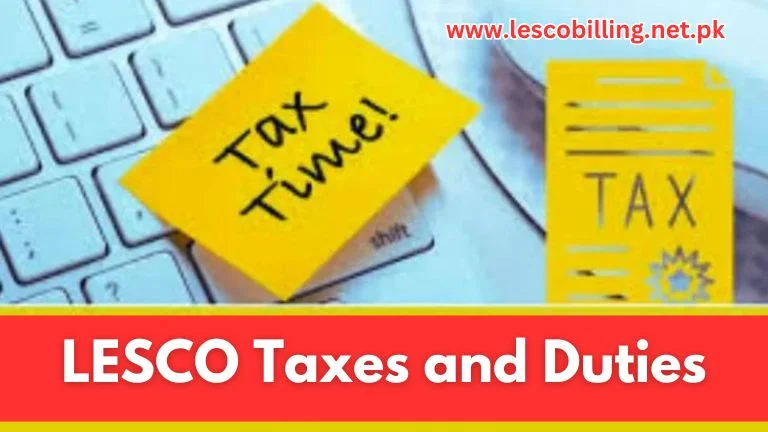Understanding LESCO Taxes and Duties
Governments impose various taxes to fund their operations, with some being collected directly, like income tax and property tax, while others are gathered indirectly, such as sales tax and excise duty. In the case of indirect taxes, the burden often falls on the end consumer, as these are included in bills or collected through other channels.
When you receive your LESCO (Lahore Electric Supply Company) electricity bill, you might notice several different taxes and duties. These include electricity duty, sales tax, federal levies, income tax, and more. This article will break down each of these charges and explore their impact on your overall electricity costs. We’ll also share tips on how to potentially reduce your electricity bill by managing these taxes.
To check your LESCO bill online, visit lescobilling.net.pk
Key LESCO Taxes and Duties Explained
Electricity Duty
Electricity duty is a provincial charge that varies between 1% and 1.5% of your electricity usage costs. As your electricity consumption increases, so does this duty, making it directly proportional to your usage.
General Sales Tax (GST)
The General Sales Tax is applied under the Sales Tax Act of 1990. It is charged at a rate of 17% on the total bill, including all other taxes. This tax is progressive, meaning it rises as the overall bill amount increases.
PTV License Fee
This fee is a fixed charge included in your bill. Domestic users pay Rs. 35, while commercial users are charged Rs. 60. Since it’s a flat rate, it doesn’t vary with your electricity usage.
Financing Cost Surcharge (FC Surcharge)
The FC Surcharge is a charge of Rs. 0.43 per kWh (unit) for most consumers, excluding lifeline domestic users. Similar to other charges, it increases with higher electricity usage.
Fuel Price Adjustment (FPA)
The FPA reflects the difference between estimated fuel costs and actual costs for the month. Since a significant portion of electricity is generated using fuel, changes in fuel prices are passed on to consumers. If actual fuel prices are higher than expected, the FPA is added to your bill; if lower, it may be deducted. This adjustment often occurs every three months, and consumers frequently find their bills significantly higher due to a positive FPA.
Extra Tax
Industrial and commercial users who are not listed on the Active Taxpayer List (ATL) of the Federal Board of Revenue (FBR) are subject to an extra tax. This tax ranges from 5% to 17%, depending on the bill amount.
Further Tax
An additional 3% tax is applied to consumers who do not possess a Sales Tax Return Number (STRN). However, this does not affect domestic, agricultural, bulk, or street light consumers.
Income Tax
Income tax is levied at varying rates depending on the consumer’s tariff and bill amount. This tax does not apply to lifeline users or those with low electricity bills.
Sales Tax
Commercial consumers are subject to a 5% sales tax on bills up to Rs. 20,000, and 7.5% for bills exceeding this threshold.
These taxes and duties can significantly increase your electricity bill, sometimes even surpassing the cost of the electricity consumed.
Tips to Reduce LESCO Taxes and Duties
Electricity bills can be a significant burden, especially for those with lower incomes. Here are some strategies to help reduce your electricity usage, which can in turn lower your overall bill:
- Be Energy Efficient: Use energy-efficient appliances and lighting.
- Monitor Consumption: Keep track of your electricity usage and try to reduce it where possible.
- Off-Peak Usage: Use heavy appliances during off-peak hours if possible, as this can sometimes reduce the cost.
- Regular Maintenance: Ensure that appliances are well-maintained to operate efficiently.
By implementing these measures, you may be able to lower your electricity consumption, and subsequently, your LESCO bill.
For further details, you can verify this information on the official Ministry of Energy Power Division website.
Stay Within the Protected Consumers Category
The government provides a subsidy to protected consumers, allowing them to benefit from significantly lower electricity rates. To qualify as a protected consumer, you need to keep your electricity usage under 200 units per month for six consecutive months. By doing so, your electricity bill will remain low, and you’ll be shielded from price hikes and additional taxes.
To achieve this, adopting a simple lifestyle and using energy-efficient appliances is essential.
Smart Energy Usage Tips:
- Energy-saving bulbs and LEDs: Replace traditional bulbs with energy-saving ones to reduce consumption.
- Energy-efficient fans: Invest in fans that consume less electricity.
- Modern refrigerators: Choose refrigerators with advanced technology that uses less energy.
- Avoid peak hours: Refrain from using heavy appliances during peak hours to keep your usage down.
Stay in the Low Consumption Slab
Aim to keep your electricity consumption within the lowest possible slab. Regularly monitor your usage to avoid exceeding this limit. Staying within a low slab not only reduces your electricity charges but also minimizes the taxes applied to your bill since many taxes increase with higher consumption levels.
Solar Energy – A Cost-Effective Solution
In today’s world, solar energy is a valuable resource. While the initial installation might require a significant investment, solar panels can provide free energy for 10 to 15 years.
As technology advances, the efficiency of solar panels improves, leading to greater energy output. By incorporating solar energy into your daily routine, particularly during daylight hours, you can drastically reduce your electricity bills. If large-scale installation is not feasible, even small-scale usage during the day can have a substantial impact on lowering your energy costs.
Register with FBR for Tax Benefits
To take advantage of tax relief, register with the Federal Board of Revenue (FBR) and obtain a National Tax Number (NTN). This step can help you avoid income tax on your electricity bill, and any taxes that do apply can be claimed as a refund at the end of the year.
Being listed on the Active Taxpayers List (ATL) of the FBR can also eliminate the additional tax of 5% to 17% for commercial and industrial users. Additionally, registering your business with the FBR and obtaining a Sales Tax Registration Number (STRN) will exempt you from the further tax of 3% on your electricity bill.
Conclusion
Electricity prices are a significant concern in Pakistan, and many of us feel the strain of rising costs. With multiple taxes contributing to our bills, it’s crucial to take proactive steps to minimize expenses. By following the guidelines outlined above, you can manage your electricity consumption more effectively, saving both energy for the nation and money for yourself.

